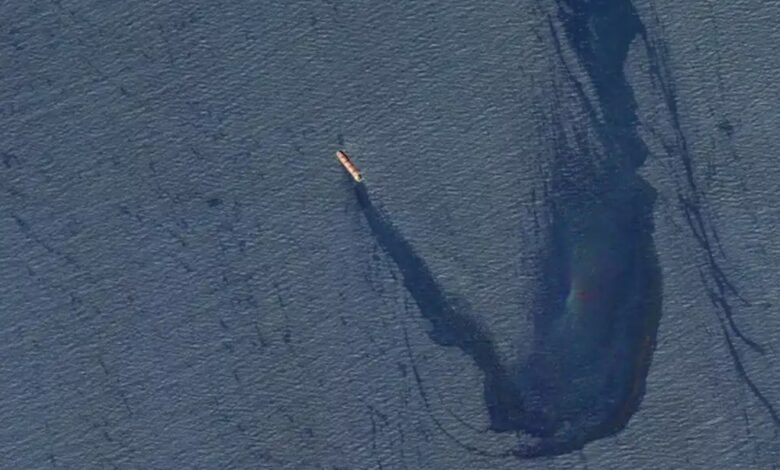
Images emerge from Houthi escalation of attacks on shipping
The missile attack by Houthi militants on the Rubymar, a ship carrying a cargo of fertilizer, has led to an “environmental disaster” in the Red Sea, US Central Command said Friday evening, while images have emerged of the first crew injury from the Houthi attacks.
The Indian Navy has released images of the aid it gave to the Palau-flagged Islander which caught fire after an attack on February 22 during which one crew member was injured – the first reported injury from the four months of attacks that have seen some 60 merchant ships targeted. The health of the crew of the Galaxy Leader, a car carrier captured and being held by the Houthis for more than three months, remains unclear.
Concern is growing that the Rubymar could sink. The ship has been taking on water and images show it is down at the stern, while satellite images show a growing 30 km long streak of bunker fuel seeping from the anchored ship.
The crew of the Belize-flagged Rubymar was forced to abandon the vessel on February 18, marking the first such evacuation since the Houthis began disrupting commercial shipping in the Red Sea in response to the war in the Gaza Strip. It is carrying around 41,000 tons of fertiliser.
On Saturday, the US-flagged Torm Thor was targeted by Houthis. An anti-ship ballistic missile aimed at the tanker was downed by the USS Mason destroyer.
American and British aircraft attacked multiple Houthi sites in Yemen over the weekend. Unbowed, the Houthi leadership vowed to escalate their attacks.
“The Yemeni Armed Forces affirm that they will confront the US-British escalation with more qualitative military operations against all hostile targets in the Red and Arabian Seas in defence of our country, our people and our nation,” the Houthi leadership said in a statement.
Data from Clarksons Research shows that as of last Friday tonnage transiting the Suez Canal was down 66% versus the first half of December, while tonnage passing the Cape of Good Hope was up 85%.
“Mounting uncertainty and shunning the Suez Canal to reroute around the Cape of Good Hope is having both an economic and environmental cost, also representing additional pressure on developing economies,” stated a new report from the United Nations Conference on Trade and Development (UNCTAD). UNCTAD estimates that thanks to increased vessel speeds to maintain schedules ships are using far more fuel, whereby for a Singapore to Rotterdam roundtrip greenhouse gas emissions could be up by as much as 70%.
Pictured below, the damage to the deck of the Palau-flagged general cargo ship Islander which was targeted with two missiles on Thursday morning off Aden.